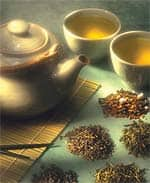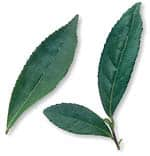Life Extension Magazine®
| LE Magazine Special Edition, Winter 2004/2005 | ||
| Why Green Tea Has Become Such a Critical Supplement | ||
Green tea is second only to water as the most consumed beverage in the world. What makes green tea extract such an important nutrient are the large volumes of published scientific findings that validate its multiple biological benefits. The most significant findings involve studies showing that green tea extract helps maintain cellular DNA and membrane structural integrity. Decades of research shows that green tea inhibits the development of undesirable cell colonies. The active constituents in green tea are powerful antioxidants called polyphenols (catechins) and flavonols. Several catechins are present in green tea and account for the bulk of favorable research reports. Epigallocatechin gallate (EGCG) is the most powerful of these catechins.1,2 EGCG functions as an antioxidant that is about 25-100 times more potent than vitamins C and E.3 One cup of green tea may provide 10-40 mg of polyphenols and has antioxidant effects that are greater than a serving of broccoli, spinach, carrots, or strawberries. Theoretically, the high antioxidant activity of green tea makes it beneficial for protecting the body from oxidative damage due to free radicals. Research shows that green tea may help maintain the health of the arterial wall by reducing lipids.4 Green tea can protect against experimentally induced DNA damage; and slow or halt the initiation and progression of undesirable cell colonies. There is also evidence from some studies that green tea provides immunoprotective qualities, particularly in the case of patients undergoing radiation or chemotherapy. White blood cell count appears to be maintained more effectively in patients consuming green tea compared to non-supplemented patients. There may also be a weight control action from green tea. In one study, mice receiving green tea in their diets had a significant suppression of food intake, body weight gain, and fat tissue accumulation.* Also, levels of cholesterol and triglycerides were lower in mice receiving the green tea diet. This study also showed that leptin levels decreased with green tea treatments, indicating that green tea may have a direct effect on reducing body weight.5 Other studies do not corroborate the weight loss inducing effects of green tea. Green Tea Extract Prices Slashed 50% The good news is consumers can now obtain highly concentrated standardized green tea extract capsules at a fraction of the prices charged just a few years ago.
The Life Extension Buyers Club offers 93% green tea extracts in either a lightly caffeinated or decaffeinated form. These 93% extracts are standardized to provide high quantities of the critical epigallocatechin gallate (EGCG). The previous green tea extract (Super Green Tea) provided 300-350 mg of 95% polyphenols per capsule. Super Green Tea Extract represented the best value on the supplement market for this highly concentrated extract. The new Mega Green Tea Extract Caps contain an unprecedented 725 mg of either lightly caffeinated or decaffeinated 93% standardized green tea extracts. Beware of Low Potency Green Tea Extracts Companies offering these low potency green tea supplements state on the label what is really in the product, but most consumers don’t know what to look for. The result is unscrupulous commercial companies can pretend to offer higher potency green tea extracts when there is actually relatively little of the active polyphenols (and the critical EGCG) present in the product. Life Extension has always precisely stated how many polyphenols its members obtain in its green tea extract supplements. Based on the abundance of new findings about the multiple health benefits of green tea, it would appear prudent to supplement with higher doses. The new Mega Green Tea Extract capsules, which provide 725 mg of 93% polyphenol standardized extract in each capsule, makes it easy to obtain super-potent doses by taking only one of these low-cost capsules per day. Each Mega Green Tea Extract capsule provides 246.5 mg of EGCG…about ten times more than what is being put into commercial multivitamin supplements today. | ||
| References | ||
| 1. Moyers SB, Kumar NB. Green tea polyphenols and cancer chemoprevention: multiples mechanisms and endpoints for phase II trials. Nutr Rev. 2004 May;62(5)204-11. 2. Kim HS, Kim MH, Jeong M, et al. EGCG blocks tumor promoter-induced MMP-9 expression via suppression of MAPK and AP-1 activiation in human gastric AGS cells. Anticancer Res. 2004 Mar-Apr;24(2B):747-53. 3. Pillai SP, Mitscher LA, Menon SR, et al. Antimutagenic/antioxidant activity of green tea components and related compounds. J Environ Pathol Toxicol Oncol. 1999;18(3):147-58. 4. Lill G, Voit S, Schror K, Weber AA. Complex effects of green tea catechins on human platelets. FEBS Lett. 2003 Jul 10;546(2-3):265-70. 5. Zheng G, Sayama K, Okubo T, et al. Anti-obesity effects of three major components of green tea, catechins, caffeine and theanine, in mice. In Vivo. 2004 Jan-Feb;18(1):55-62 |


